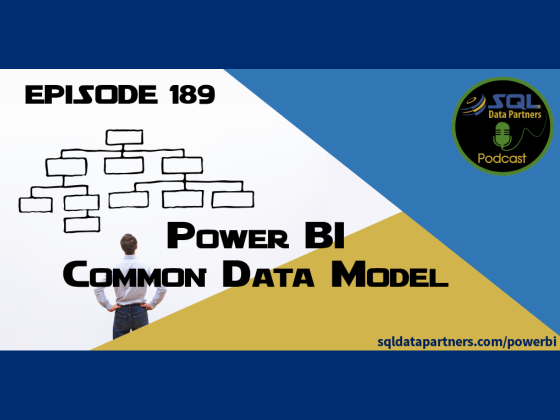Power BI Common Data Model
Moving data is fairly straightforward; however, mapping data from one source to another can be extremely challenging. In an attempt to help self-service BI users, Microsoft has introduced a Common Data Model and in this episode, we discuss the new model. This may not be as approachable for organizations which already have a data warehouse; however, for those who are in the Microsoft suite of tools and looking to report on that data in Power BI, the Common Data Model may be the jump start to get the model you need to get going.
Episode Quotes
“I think the naming’s a little bit misleading or maybe aspirational, because you look at the name, you assume, “oh, this is just like a traditional data warehouse or maybe like an OLTP, single source of truth or something like that.” And to me, it feels a little bit different.”
“Dynamics may not be as ubiquitous as SQL Server, however, for those organizations that do have Dynamics and then want to start integrating into some of these other pieces, I can see where it gives you that framework.”
“This is kind of a low-code data warehousing solution. And not only that, but one of the things that I’ve been interested in with this is, potentially it seems like a way to have like, platform as a service data storage for something like Power Apps or whatnot.”
Listen to Learn
00:38 Intro to the topic
01:14 Compañero Shout-Outs
01:56 Why do we need to have Common Data Model?
05:48 The Power community is still small, but growing quickly
07:33 This seems good for low-code business users
09:29 Eugene has not found a specific use case for the CDM
11:54 Your data is not living in a traditional relational database
14:03 The Open Data Initiative & competing with Salesforce
15:35 If you compañeros have experience with the CDM, please reach out to us
18:25 Closing Thoughts
I think the naming’s a little bit misleading or maybe aspirational, because you look at the name, you assume, “oh, this is just like a traditional data warehouse or maybe like an OLTP, single source of truth or something like that.” And to me, it feels a little bit different
Meet the Hosts

Carlos Chacon
With more than 10 years of working with SQL Server, Carlos helps businesses ensure their SQL Server environments meet their users’ expectations. He can provide insights on performance, migrations, and disaster recovery. He is also active in the SQL Server community and regularly speaks at user group meetings and conferences. He helps support the free database monitoring tool found at databasehealth.com and provides training through SQL Trail events.

Eugene Meidinger
Eugene works as an independent BI consultant and Pluralsight author, specializing in Power BI and the Azure Data Platform. He has been working with data for over 8 years and speaks regularly at user groups and conferences. He also helps run the GroupBy online conference.

Kevin Feasel
Kevin is a Microsoft Data Platform MVP and proprietor of Catallaxy Services, LLC, where he specializes in T-SQL development, machine learning, and pulling rabbits out of hats on demand. He is the lead contributor to Curated SQL, president of the Triangle Area SQL Server Users Group, and author of the books PolyBase Revealed (Apress, 2020) and Finding Ghosts in Your Data: Anomaly Detection Techniques with Examples in Python (Apress, 2022). A resident of Durham, North Carolina, he can be found cycling the trails along the triangle whenever the weather's nice enough.
Want to Submit Some Feedback?
Did we miss something or not quite get it right? Want to be a guest or suggest a guest/topic for the podcast?
